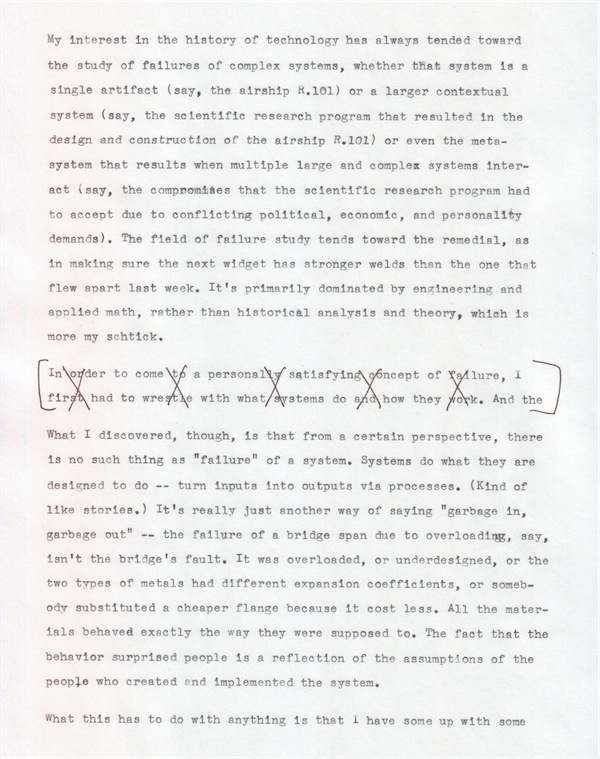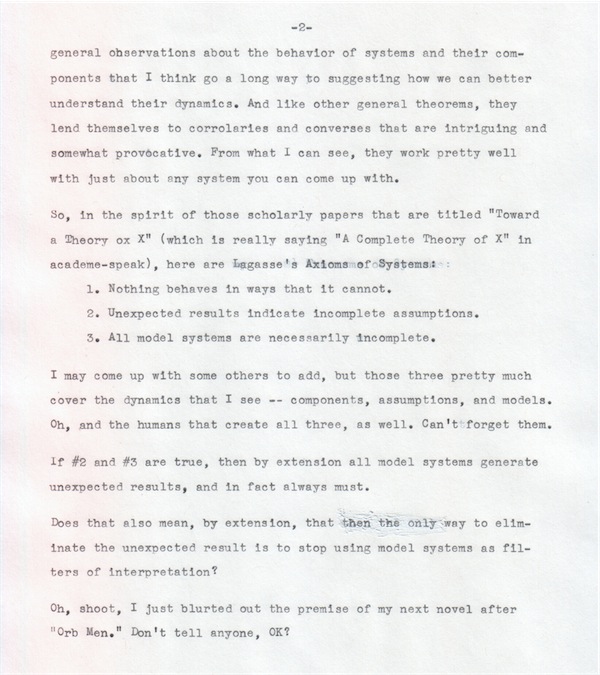Lagasse’s Axioms of Systems


Oh yeah, and today is Friday the 13th. Had a meeting downtown DC today. Got on the Metro in time to hear the conductor apologizing for delays due to rolling power outages, a sick person at Farragut West, a fire at Metro Center, DuPont Circle closed . . . sheesh.
Other than a long wait at Metro Center on the way home because they were single-tracking through the station, I had no problems today. Unlike many, many other commuters.
Categorised as: Typecasting
Comments are disabled on this post
I think I’m on the right track. Today, while enjoying my Sunday morning reading, I came across this article in the (London) Times Online, of all places:
“Nassim Nicholas Taleb: the prophet of boom and doom”
http://business.timesonline.co.uk/tol/business/economics/article4022091.ece?print=yes&randnum=1212475411171
The money quotes:
“Last May, Taleb published The Black Swan: The Impact of the Highly Improbable. It said, among many other things, that most economists, and almost all bankers, are subhuman and very, very dangerous. They live in a fantasy world in which the future can be controlled by sophisticated mathematical models and elaborate risk-management systems.”
“To explain: black swans were discovered in Australia. Before that, any reasonable person could assume the all-swans-are-white theory was unassailable. But the sight of just one black swan detonated that theory. Every theory we have about the human world and about the future is vulnerable to the black swan, the unexpected event. We sail in fragile vessels across a raging sea of uncertainty. ‘The world we live in is vastly different from the world we think we live in.'”
I have GOT to read this guy’s book.
I have been thinking more about psychology than machines/systems lately, and I think your theory interestingly applies to human behavior/psychiatric disorders. Indeed, there is no such thing as failure of a system, at least that you couldn’t trace to a specific and possibly avoidable cause. Hm, not transposing the theory well…
I think you’re right, it has a definite application to the mental models we build to make sense of the universe, both the ones we make ourselves and the ones we adopt that were created by others. (And thereby hangs the plot of my novel!)
I hadn’t thought of the axioms in relation to psychiatric disorders, though, but I can see how they can be naturally extended there. The unspoken meta-axiom behind them is that “we do the best we can with the chemicals we have.” What Vonnegut said with futility, I say with awe: “It’s all just chemicals.” It’s truly a wondrous, humbling thing.
Brains are pattern-recognition devices, and a model is, at heart, simply a projection forward in time of previously-discerned patterns. When you tinker with the chemicals — either through a naturally occurring imbalance or through pharmaceuticals — you alter the models.
Hmmm, now you’ve got me seriously thinking here! 🙂 Did you ever read my essay on cognicentrism? (http://avwrites.com/sv/dispatch3.html) I haven’t moved it over from the old site yet. I think it ties into this discussion…
Time for another axiom, actually more of a lemma, which I call Lagasse’s Derivation of Clarke’s Law: “Any sufficiently complex system is indistinguishable from randomness.”
Oh yeah, and there’s a fourth parameter to systems, which I didn’t suss out until recently: rules. A more complete definition of what systems are designed to do is: to “turn inputs into outputs via processes that are governed by rules.”
An interesting piece by the ever-thoughtful Scott Adams where he proposes the concept of a complexity threshold, which I find to be a compelling approach to the issue of failure risk in complex systems:
http://dilbert.com/blog/entry/adams_complexity_threshold/
At the intersection of my Second Axiom of Systems and my Derivation of Clarke’s Law I found this sitting there: “In a closed system, ‘randomness’ represents the input of an unconsidered variable.” Such a variable could be acting from outside the system’s considered parameters, or from within. Either way, a so-called “random result” is just the footprint left behind by a variable. Happy hunting!